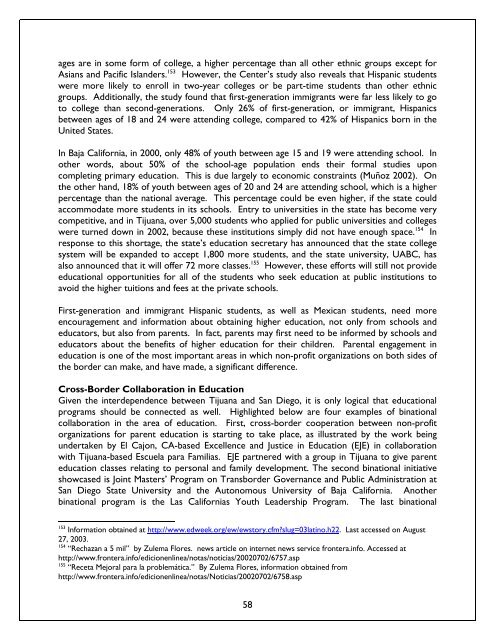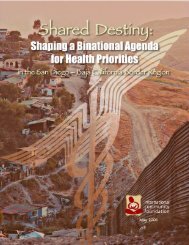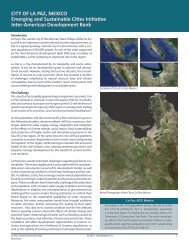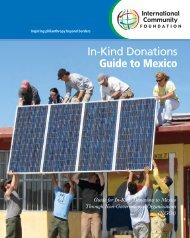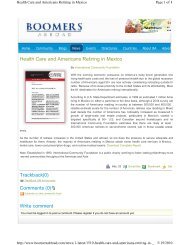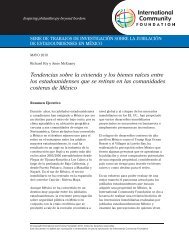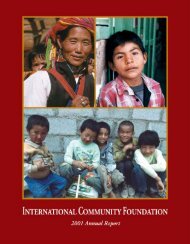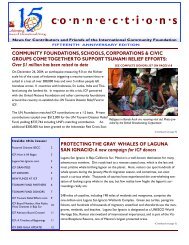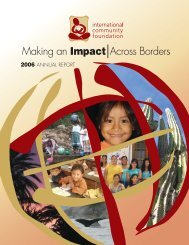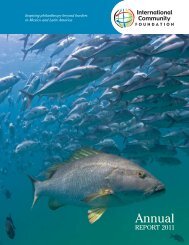Blurred Borders - International Community Foundation
Blurred Borders - International Community Foundation
Blurred Borders - International Community Foundation
You also want an ePaper? Increase the reach of your titles
YUMPU automatically turns print PDFs into web optimized ePapers that Google loves.
ages are in some form of college, a higher percentage than all other ethnic groups except for<br />
Asians and Pacific Islanders. 153 However, the Center’s study also reveals that Hispanic students<br />
were more likely to enroll in two-year colleges or be part-time students than other ethnic<br />
groups. Additionally, the study found that first-generation immigrants were far less likely to go<br />
to college than second-generations. Only 26% of first-generation, or immigrant, Hispanics<br />
between ages of 18 and 24 were attending college, compared to 42% of Hispanics born in the<br />
United States.<br />
In Baja California, in 2000, only 48% of youth between age 15 and 19 were attending school. In<br />
other words, about 50% of the school-age population ends their formal studies upon<br />
completing primary education. This is due largely to economic constraints (Muñoz 2002). On<br />
the other hand, 18% of youth between ages of 20 and 24 are attending school, which is a higher<br />
percentage than the national average. This percentage could be even higher, if the state could<br />
accommodate more students in its schools. Entry to universities in the state has become very<br />
competitive, and in Tijuana, over 5,000 students who applied for public universities and colleges<br />
were turned down in 2002, because these institutions simply did not have enough space. 154 In<br />
response to this shortage, the state’s education secretary has announced that the state college<br />
system will be expanded to accept 1,800 more students, and the state university, UABC, has<br />
also announced that it will offer 72 more classes. 155 However, these efforts will still not provide<br />
educational opportunities for all of the students who seek education at public institutions to<br />
avoid the higher tuitions and fees at the private schools.<br />
First-generation and immigrant Hispanic students, as well as Mexican students, need more<br />
encouragement and information about obtaining higher education, not only from schools and<br />
educators, but also from parents. In fact, parents may first need to be informed by schools and<br />
educators about the benefits of higher education for their children. Parental engagement in<br />
education is one of the most important areas in which non-profit organizations on both sides of<br />
the border can make, and have made, a significant difference.<br />
Cross-Border Collaboration in Education<br />
Given the interdependence between Tijuana and San Diego, it is only logical that educational<br />
programs should be connected as well. Highlighted below are four examples of binational<br />
collaboration in the area of education. First, cross-border cooperation between non-profit<br />
organizations for parent education is starting to take place, as illustrated by the work being<br />
undertaken by El Cajon, CA-based Excellence and Justice in Education (EJE) in collaboration<br />
with Tijuana-based Escuela para Familias. EJE partnered with a group in Tijuana to give parent<br />
education classes relating to personal and family development. The second binational initiative<br />
showcased is Joint Masters’ Program on Transborder Governance and Public Administration at<br />
San Diego State University and the Autonomous University of Baja California. Another<br />
binational program is the Las Californias Youth Leadership Program. The last binational<br />
153<br />
Information obtained at http://www.edweek.org/ew/ewstory.cfm?slug=03latino.h22. Last accessed on August<br />
27, 2003.<br />
154<br />
“Rechazan a 5 mil” by Zulema Flores. news article on internet news service frontera.info. Accessed at<br />
http://www.frontera.info/edicionenlinea/notas/noticias/20020702/6757.asp<br />
155<br />
“Receta Mejoral para la problemática.” By Zulema Flores, information obtained from<br />
http://www.frontera.info/edicionenlinea/notas/Noticias/20020702/6758.asp<br />
58


